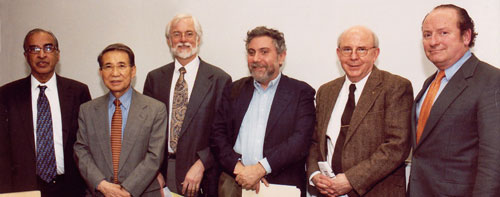contents A LETTER FROM THE DEAN PUBLIC OFFERINGS
Treasury Secretary John Snow advises directors, Nobel laureates gather to honor a colleague, and Liz Claiborne’s global designer STERN IN THE CITY
Kenny Lao’s Rickshaw
delights diners
By Jessica Neville
A scrapbook venture
worth keeping
By Stephanie Sampiere
8 questions for NASDAQ
CEO RobertGreifeld COVER STORY – HIGH RISE
Sonny Bazbaz’s express elevator ride in New York real estate
By Susan C. Walsh LEADING INDICATORS
Stern’s CEO Series: Getting down to business with Craig Donohue of the Chicago Mercantile Exchange, James H. Quigley of Deloitte & Touche USA, and Jack Welch, formerly of General Electric PROSPECTUS
New faculty, noteworthy papers, awards, and honors
Office Hours –
Faculty Research THE BEST LAID PLANS
Are 401(k) plans offering investors adequate choices?
By Edwin Elton, Martin J. Gruber, and Christopher R. Blake A PENNY SAVED
Why soap retails for $1.99 instead of $2.00
By Manoj Thomas and
Vicki Morwitz DIGITAL RIGHTS & WRONGS
How old media can profitably manage digital content
By Gal Oestreicher-Singer and Arun Sundararajan FOUND IN TRANSLATION
For Hollywood, the Golden Arches can point to box-office gold overseas
By C. Samuel Craig, William H. Greene, and Susan P. Douglas |
PEER-TO-PEER
Student Life in Washington Square and Beyond: Volunteer consulting, the ultimate Hollywood career, and from Russia with degrees CLASS NOTES PAST PERFORMANCE
“Dr. Bob” Kavesh has long found poetry in economics
By Daniel Gross | | 

| From left to right: William Allen chairs the Directors Fiduciary Duty of Care panel; US Treasury Secretary John Snow joins NYU Trustees Ken Langone and Martin Lipton; Charles Prince delivers the luncheon keynote address. | DIRECTIONS FOR DIRECTORS An NYU Stern event in early June attended by more than 80 experts and practitioners in the fields of law, business, and regulation brought new meaning to the term “high-level discussion.” The Third Annual Directors’ Institute, hosted by the NYU Center for Law & Business, featured both the US Treasury Secretary and the chief executive officer of the nation’s largest bank. The Center, a joint initiative between NYU Stern School of Business and NYU School of Law, created the Directors’ Institute to help directors stay current on their legal, fiduciary, and ethical responsibilities. In a keynote dinner address opening the event, Treasury Secretary John Snow underscored the need for balance in enforcing the Sarbanes-Oxley Act. “The American corporation has been and continues to be an extraordinary engine for economic development, innovation, and change. Sarbanes-Oxley was a much needed and timely tool for keeping that engine on track and running properly,” he said. “We need to make sure it is not inadvertently applied in a way that cripples that engine.” The Directors’ Institute included four sessions on such topics as the relationship between the board and the CEO; the governance role of the general counsel; the audit committee and the board’s oversight of risk management; and the director’s fiduciary duty of care, the Securities and Exchange Commission, and judicial expectations. It also featured expert panelists from Stern and NYU School of Law, the Securities and Exchange Commission, and the Delaware Supreme Court, as well as directors, chairmen, and CEOs of companies such as American Express, Ernst & Young, The Estee Lauder Companies Inc., McKinsey & Co., and TIAA-CREF. Citigroup CEO Charles Prince, who delivered the lunch keynote address, spoke about Citigroup’s efforts to establish a better balance between short-term and long-term thinking. Prince said rules are not enough to ensure that employees comply with the law. He explained that for Citigroup, compliance and controls serve as safety nets only, whereas common principles and values should set the tone and behavior for the organization’s nearly 300,000 employees. The company has begun to emphasize a principles-based approach to governance, creating a common vision around shared responsibilities. In addition to establishing a Five Point Plan that systematically embeds these values into its culture, Citigroup has developed initiatives such as employee stock ownership and business practices committees that encourage employees to think for the long-term. In his welcoming remarks, William R. Berkley (BS ’66), chairman and CEO of W.R. Berkley Corporation, vice chairman of the NYU Board of Trustees, and chairman of the NYU Stern Board of Overseers, introduced a theme that would recur throughout the event. Berkley cautioned boards not to react to the aggressive enforcement environment by becoming risk averse. Martin Lipton, senior partner at Wachtell, Lipton, Rosen & Katz and chairman of NYU Board of Trustees, led a panel discussion at which members discussed whether the role of the CEO and chairman should be divided. Most panelists recommended that individual boards should be trusted to decide for themselves. William Allen, director of the NYU Center for Law & Business and Nusbaum Professor of Law and Business, shared his thoughts on the Directors’ Institute: “As an educational institution, we have a responsibility to debate and shape, in partnership with the business community, the thinking that will further inform corporate governance reforms and help restore investor confidence in the corporation.”  Professor Rama Ramachandran (left), head of the Japan Center, welcomes panelists honoring Paul Samuelson. From left to right: Ryuzo Sato, Stephen Figlewski, NYU Stern professor of finance; Paul Krugman; Richard Sylla, Henry Kaufman Professor of the History of Financial Institutions and Markets at NYU Stern; and Robert Merton. | NOBEL GATHERING Economists often get criticized for equivocating. Fed up with advisers who constantly offered on-the-one-hand, on-the-other-hand arguments, President Harry S. Truman famously proclaimed that he wished for a one-armed economist. But when a group of distinguished economists gathered at NYU Stern on April 8 to honor Nobel Laureate Paul A. Samuelson, their conclusions were emphatic and unanimous. The noted economic theorist, professor, and author, currently in his 19th and final year as Shinsei Bank Visiting Professor at NYU Stern's Japan-US Center, had significantly influenced their work – and their profession. To honor Samuelson, NYU Stern's Japan-US Center, which is celebrating its 20th anniversary this year, assembled a panel of distinguished economists from leading universities. All members of the group, which included two Nobel Prize winners, had studied with Samuelson at the Massachusetts Institute of Technology. Joseph Stiglitz, a Nobel laureate and professor of economics and finance at Columbia University, said that Samuelson had taught him the value of simple models, and that he “helped clarify thinking, constructing models to provide better distinctions on previous work.” Paul Krugman, professor of economics and international affairs at Princeton University and an op-ed columnist for The New York Times, discussed how Samuelson's open mindedness helped him realize that things we may find uncomfortable may be true. Jeremy Siegel, Russell E. Palmer Professor of Finance at the Wharton School of Business, noted that Samuelson, who turned 90 last spring, also has a deep respect for the knowledge of people who came before him. The commentary reflected on a common theme. Samuelson is a great mathematician and economic theorist who is grounded in the real world, and who has the capacity to regard his own positions critically as the world around him changes. Robert Shiller, Stanley B. Resor Professor of Economics at Yale University, related Samuelson's policies of yesterday to one of today's hottest topics – Social Security – saying that President George W. Bush's Social Security reform plan was inspired in some ways by Samuelson – although he wishes it had gone further. But not all the day's discussion revolved around economic research and public policy. Ryuzo Sato, C.V. Starr Professor of Economics and director of the Center for Japan-US Business and Economics at NYU Stern, who translated Samuelson's Foundations of Economic Analysis textbook into Japanese, described how Samuelson boarded the wrong train in Tokyo – without tickets, passport, or other belongings. Although the incident left Sato in a “cold sweat,” he and Samuelson were happily reunited a few hours later with the assistance of several helpful train conductors. In sharing tips on winning a Nobel Prize, Robert Merton, a Nobel laureate and John and Natty McArthur University Professor at Harvard Business School, joked, “It's simple. To win a Nobel Prize, you go to MIT, you go into Paul's office, and you listen.” Alan Blinder, Gordon S. Rentschler Memorial Professor of Economics at Princeton, aptly concluded the conversation by noting, “There will probably never again be another economist with as much influence on our discipline as Paul Samuelson.” | 
CONFERENCE CALLS The Networks, Electronic Commerce, and Telecommunications (NET) Institute, a non-profit devoted to research on network industries, in conjunction with the NYU Center for Law & Business, hosted its annual conference at NYU Stern on April 1. Nicholas Economides, professor of economics at Stern and executive director of the NET Institute, chaired the conference, which showcased cutting-edge global research in a variety of network industries – electronic commerce, telecommunications, the Internet, and “virtual networks.” Professors at institutions including Stern, Carnegie Mellon, George Washington University, London School of Economics, University of Chicago, University of Pennsylvania, and the University of Tokyo, presented research on topics such as electromagnetic spectrum auctions to be used for wireless telecommunications, shareware and adware pricing, competition among airlines, video game platforms, and ATM networks. These areas represent fertile ground for research. “In contrast with non-network industries, in network industries, there are very significant inequalities in market shares and prices but not full monopoly – it is a winner-takes-most world, not a winner-takes-all,” said Professor Economides. “In network industries, competition is more ‘for the market’ rather than ‘in the market.’” Stern Professors John Asker, Adam Brandenburger, and Paris Cleanthous and PhD student Christian Dezso made short presentations as discussants in the day’s events, and Stern Professors Economides and Arun Sundararajan chaired the telecommunications and computer network sessions, respectively. The NYU Center for Law & Business, a research center of the Stern School of Business and the NYU School of Law, aims to enhance educational and research opportunities of students, faculty, and practitioners interested in areas where law, finance, and economics intersect. 
Raymond Beier speaks about corporate governance; Abby Joseph Cohen addresses the audience; panel participants; Seymour Jones greets Abby Joseph Cohen. CURRENT ACCOUNTING EVENT The Sarbanes-Oxley Act, which Congress passed in 2002 in response to a cascade of corporate accounting scandals and bankruptcies, was the most far-reaching corporate governance legislation enacted in more than 50 years. Its provisions include requirements that chief executive officers sign off on corporate earnings and that a majority of the board of directors be independent. One of the most important components of the act is Section 404, which requires companies to develop a system of internal controls and then to issue annual reports attesting to the effectiveness of those controls. One year after the implementation of Section 404, NYU Stern’s Vincent C. Ross Institute of Accounting Research convened leaders from academia and from the investment, legal, and accounting industries to discuss the impact of Section 404 – its costs, benefits, and impact on public companies, corporate governance, and consumer confidence. NYU Stern Accounting Professor Seymour Jones moderated the panel discussion. NYU Stern Accounting Professor Eli Bartov noted that establishing and maintaining adequate internal control structures and procedures for financial reporting is an enormously costly enterprise. But he wondered: “Will Section 404 prevent or even reduce deceptive behavior by top management or financial statement fraud?” Lynn Turner, former chief accountant at the Securities and Exchange Commission, acknowledged that the initial costs of complying with 404 are steep. But he suggested they will fall over time. What’s more, they’re a drop in the bucket when compared to the costs of financial accounting fraud. Alan Annex, a partner at the New York law firm Greenberg Traurig, LLP, highlighted another benefit. Companies, who would rather be “more safe than sorry,” are reporting any and all accounting deficiencies – even if they are not considered material weaknesses. Douglas Carmichael, chief auditor of the Public Company Accounting Oversight Board, discussed the history behind Section 404. He emphasized that while it was established to reduce the probability of fraud, it can not entirely eliminate risk. Mark Lilling, CPA, of Auditing Committee Consulting Team LLC, outlined Section 404’s requirements. And Raymond Beier, a partner at PricewaterhouseCoopers, and Thomas Knudsen, a partner at Ernst & Young, described the effect of Section 404 on corporate governance. There has been greater involvement of audit committees and boards with respect to financial reporting and insuring that the numbers companies report are accurate. Marti Subrahmanyam, professor of finance and economics at NYU Stern, and a member of several corporate boards, noted that he had already seen the positive impact Section 404 has had on corporate governance. Abby Joseph Cohen, chief US portfolio strategist at Goldman, Sachs & Co., noted that Section 404 has helped restore consumer confidence. Most Goldman Sachs clients, she noted, said they saw immediate benefits to 404 – either because they discovered problems they were able to fix before they became larger problems, or because 404 provided a spur to redesign their accounting systems. In a sign that management of all types of companies are taking Sarbanes-Oxley to heart, panelist James Feely, director and chief financial officer at TDI Transistor Services, discussed why TDI, a private company, was considering complying with Sarbanes-Oxley now – in case management decided to go public in the future. NETWORK NEWS At many academic meetings, networking is one of the key activities. But at a workshop for doctoral students held by NYU Stern's Center for Digital Economy Research (CeDER) on June 15 through 17, networking and the role of networks was the dominant topic of discussion and debate. The workshop was attended by more than 40 PhD candidates from a range of universities who are interested in the economics of information technology (IT). Consisting of tutorials and informal discussions led by prominent economics and IT scholars, the workshop was designed to improve the students' research skills and to better connect them with the community of IT economics scholars. The sessions, which included topics such as bounded rationality, IT and organizations, and complex networks, featured experts from Stern, INSEAD, Stanford University, and University of California, Berkeley. In her opening remarks, Lee Sproull, Stern’s vice dean of faculty and professor of information systems and management, encouraged students to view the forum as an opportunity to strengthen the worldwide community of IT economics scholars. Vasant Dhar, co-director for CeDER and professor of information systems at Stern, said the forum was unique because it brought together students who would not otherwise realize that they belong to the same research community. “IT economics has generated interest among people in economics, information technology, marketing, and sociology,” said Dhar. In a tutorial on complex networks, workshop co-organizer Arun Sundararajan, assistant professor of information systems at Stern, explained how models of complex networks like those used to study the route of transmission of infectious diseases and the structure of social networks can be applied to IT economics research in a number of ways. Workshop co-organizer and Stern Professor of Economics and Information Systems Roy Radner discussed the continuing importance of understanding bounded rationality when studying IT economics. Stern Economics Department Chairman Luis Cabral shared his research on the importance of reputation and trust between buyers and sellers in online markets and on mechanisms to study reputation in IT economics. He argued that eBay would not be as successful if its users did not have a system by which they could establish trust among sellers and buyers. University of California at Berkeley Professor Joseph Farrell's session explored the models of standards formation and unbundling and leverage. A former chief economist of the FCC, Farrell explained the three models of standards formation: bandwagon, authority, and consensus. A preceding panel on networks featured a lively debate between Farrell and Nicholas Economides, professor of economics at Stern, on the success of the Telecommunications Act of 1996. Timothy Bresnahan, chair of Stanford University's economics department, and a former chief economist of the US Department of Justice Antitrust Division, discussed the relationship of IT to growth and business cycles. In detailing the '90s boom and bubble, Bresnahan noted that IT led the growth, but wasn't accepted as quickly as initially anticipated. Erik Brynjolfsson, the Schussel Professor at MIT and one of BusinessWeek's EBiz 25 Visionaries, described the organizational changes essential for successful corporate IT investments, and drew a parallel between the current IT revolution and the adoption of electricity. |  FASHION FORWARD ALUMNUS FASHION FORWARD ALUMNUS New York City is the capital of many things, among them, luxury retailing. As a result, NYU Stern graduates frequently don't have to travel far from campus to make their careers in this rapidly expanding field. Jorge Figueredo (MBA '95) has come a long way since graduating from NYU Stern, yet as president of Liz Claiborne International, he works in midtown, just a few miles from Washington Square.  Jorge Figueredo joins members of Stern's Luxury and Retail Club: (from left) Thomas Jonchere (MBA '04 and Liz Claiborne analyst), Yi-Hsian Huang, Ron Klein, Figueredo, Sonali Palkhiwala, and Jennifer Hong. Jorge Figueredo joins members of Stern's Luxury and Retail Club: (from left) Thomas Jonchere (MBA '04 and Liz Claiborne analyst), Yi-Hsian Huang, Ron Klein, Figueredo, Sonali Palkhiwala, and Jennifer Hong. | This spring, NYU Stern's new Luxury and Retail Club welcomed Figueredo back to campus. At an event attended by MBA students, alumni, and professors, Figueredo offered a broad overview of Liz Claiborne and its 40 brands, which include Juicy Couture, Kenneth Cole, and DKNY Jeans, and described the company's global expansion – particularly in China. A 1982 graduate of Fairfield University, Figueredo joined Liz Claiborne in 1984. After rising through a series of human resources posts, he was named president of the international division in 1999. During a question and answer session, Figueredo talked about the importance of marketing in the retail industry. As part of an effort to cross-sell brands, the company each week reviews its top revenue-generating products for synergies. He also cited specific examples of top brands and their markets. The company's Mexx store in Moscow, Russia, is one of its most profitable stores, for example. “Mr. Figueredo is a wonderful example of how MBA graduates can lead in retail,” said Jennifer Hong, vice president of marketing for the Luxury and Retail Club. “By combining his strengths in finance, strategy, and marketing with his passion for this exciting industry, he has helped to propel Liz Claiborne into a $4 billion business.” | | |


![]()